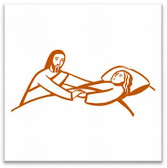Pastor Janell's sermon focused on the rest part of this repeating cycle. She referenced our Annual Meeting that happened today and how much Creator has done despite the pandemic in helping our community and our neighbors. Again and again my epiphanies with Creator come at the intersection of what is currently happening in the world and what is in the Gospel.
For example, we want to quickly move from division to unity in this country. Today was Super Bowl Sunday. A Jeep ad that featured Bruce Springsteen stirred hearts and a bit of controversy. The commercial, while aiming to be inspirational, falls short from the perspectives of both history and theology. Some accused the ad of Christian nationalism. Others criticized the idea of a “middle.” Beyond its obvious emotional appeal, aspects of the narrative are troubling.
This reminded me of a commercial and a controversy that caught my
attention years ago. It was a Dodge Ram's Super Bowl Ad which heavily featured a speech
by civil rights activist Martin Luther King Jr. The commercial pulls
from King's speech on greatness and service, which was delivered 50
years ago on February 4. This has been called The Drum Major Instinct
speech. Dr. King addressed what he called the great task of life. The
task he identified was to essentially transform our ego by redirecting
our desires away from selfish, competitive goals and towards our
spiritual growth and service to others.
"Recognize that he who is greatest among you shall be your servant
... That's your new definition of greatness — it means that everybody
can be great because everybody can serve," King says in a voiceover
during the Superbowl commercial, which depicts fishermen, military,
football players, and others on the job before cutting to shots of Dodge
Ram trucks. The commercial ended with Dodge's tagline, "Built to Serve."
Many thought this undercut and co-opted Dr. King's original message.
Partly they speculated that he would not have approved of his words
being used in this manner since King's speech February 4 had railed on advertisers (a
part of the speech obviously not quoted in the ad). And partly it
was because of where the commercial was placed. The Super Bowl in
particular and football in general provide great examples of games of
dominance. Competition perhaps brings out the best in us and hones
skills when it is on the field. As it becomes more and more ingrained in
our social fabric, our identities, and how we live our lives; a
price is paid.
Back from the synagogue in Mark, a public place for men, Jesus goes into a house, a private place for women. It belongs to Simon and Andrew, the two brothers who were the first recruits in Mark 1:16-18. He comes with a male entourage that includes two sets of brothers, Peter and Andrew and James and John, and is told that Simon’s mother-in-law is in bed with a fever. She is not named, which shows that she was an ordinary woman. Only women deemed important by the Gospel writer are mentioned by name in Mark (see Mark 6:17-29; 15:40; 16:1).
Jesus comes into the house and finds the sick woman. He takes her by the hand and lifts her up (see Mark 5:41). Apparently she is healed right away because she begins to serve them. The word for serving is diakoneo, which denotes not only providing them with food, but also service in general as women did in those days as part of Mediterranean hospitality.
The fact that the first person to be healed in the story is a woman is significant. It shows that from the very beginning Jesus sided with the least of society. But he was a first century Jew and could not escape the mores of his culture. He still expected women to serve him and his group of followers.
The positive message of this healing, and the other cures in Mark, is that they represent Jesus’ ideology of inclusion: those healed are incorporated back into society. Simon’s mother-in-law returns to her role as a woman in the society of the time (verse 31) and the leper is told to fulfill his responsibilities as a member of the covenant people (verse 44).
There is also the idea of rest. Allow ourselves to pray and not be anxious about the immediate demands of history and justice. Both will come to pass.
Hopefully this is the new way the ReUnited States of America will be built.





No comments:
Post a Comment